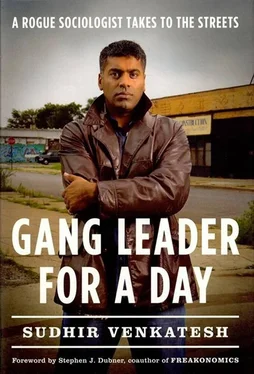I didn’t return to Robert Taylor for a week, until J.T. called to invite me to a birthday party for his four-year-old daughter, Shuggie.She was one of two daughters that J.T. had with his girlfriend Joyce; the other girl, Bee-Bee, was two. J.T. and Joyce seemed pretty close. But then again J.T. also seemed close with Missie and their son, Jamel. As much as J.T. seemed to trust me and let me inside his world, he was fiercely protective of his private life. Except for benign occasions like a birthday party, he generally kept me away from his girlfriends and his children, and he often gave me blatantly contradictory information about his family life. I once tried asking why he was so evasive on that front, but he just shut me down with a hard look.
I was nervous as I rode the bus toward Robert Taylor, but my reunion with J.T. was anticlimactic. The party was so big, with dozens of friends and family members, that it was split between Ms. Mae’s apartment and another apartment upstairs where J.T.’s cousin LaShona lived. Ms. Mae had cooked a ton of food, and there was a huge birthday cake. Everyone was having a good, loud time.
J.T. strode right over and shook my hand. “How you feel?” he asked-one of his standard greetings. He stared me down for a moment but said nothing more. Then he winked, handed me a beer, and walked away. I barely saw him the rest of the party. Ms. Mae introduced me to some of her friends-I was “Mr. Professor, J.T.’s friend,” which conferred immediate legitimacy upon me. I stayed a few hours, played some games with the kids, and then took the bus home.
J.T. and I resumed our normal relationship. Even though I couldn’t stop thinking about the C-Note beating, I kept my questions to myself. Until that incident I had seen gang members selling drugs, tenants taking drugs, and plenty of people engaged in small-time hustles to make money. While I was by no means comfortable watching a drug addict smoke crack, the C-Note affair gave me greater pause. He was an old man in poor health; he could hardly be expected to defend himself against men twice his size and half his age, men who also happened to carry guns.
What was I, an impartial observer-at least that’s how I thought of myself-supposed to do upon seeing something like this? I actually considered calling the police that day. After all, C-Note had been assaulted. But I didn’t do anything. I am ashamed to say that I didn’t even confront J.T. about it until some six months later, and even then I did so tentatively.
The confrontation happened after I witnessed another incident with another squatter. One day I was standing outside the building’s entryway with J.T. and a few other BKs. J.T. had just finished his weekly walk-through of his high-rise. He was having a quick meeting with some prostitutes who’d recently started working in the building, explaining the rules and taxes. The tenants, meanwhile, went about their business-hauling laundry, checking the mail, running errands.
A few of J.T.’s junior members came out to tell him that one of the squatters in the building, a man known as Brass, refused to pay the gang’s squatting fee. They had brought Brass with them down to the lobby. I could see him through the entryway. He looked to be in his late forties, but it was hard to say. He had only a few teeth and seemed in pretty bad shape. I’d heard that Brass was a heroin addict with a reputation for beating up prostitutes. He was also known for moving around from building to building. He wasn’t a regular squatter like C-Note, who was on familiar terms with all the tenants. Brass would anger the tenants in one building and then pack up and move along.
J.T. dispatched Price, one of his senior officers, to deal with Brass. Unlike C-Note, who offered only a little resistance, Brass decided to fight back. This was a big mistake. Price was generally not a patient man, and he seemed to enjoy administering a good beating. I could see Price punching Brass repeatedly in the face and stomach. J.T. didn’t flinch. Everyone, in fact-gang members and tenants alike- just stood and watched.
Brass started to crawl toward us, making his way outside to the building’s concrete entryway. Price looked exhausted from hitting Brass, and he took a break. That’s when some rank-and-file gang members took over, kicking and beating Brass mercilessly. Brass resisted throughout. He kept yelling “Fuck you!” even as he was being beaten, until he seemed unconscious. A drool of blood spilled from his mouth.
Then he began flailing about on the ground in convulsion, his spindly arms flapping like wings. By now his body lay just a few feet from us. I g roaned, a nd J.T. pulled me away. Still no one came to help Brass; it was as if we were all fishermen watching a fish die a slow death on the floor of a boat.
I leaned on J.T.’s car, quivering from the shock. He took hold of me firmly and tried to calm me down. “It’s just the way it is around here,” he whispered, a discernible tone of sympathy in his voice. “Sometimes you have to beat a nigger to teach him a lesson. Don’t worry, you’ll get used to it after a while.”
I thought, No, I don’t want to get used to it. If I did, what kind of person would that make me? I wanted to ask J.T. to stop the beating and take Brass to the hospital, but my ears were ringing, and I couldn’t even focus on what he was telling me. My eyes were fixed on Brass, and I felt like throwing up.
Then J.T. grabbed me by the shoulders and turned me away so I couldn’t watch. But out of the corner of my eye, I could see that a few tenants finally came over to help Brass, while the gang membersjust stood over him doing nothing. J.T. held me up, as if to comfort me. I tried instead to support my weight on his car.
That’s when C-Note slipped into my thoughts.
“I understand that Brass didn’t pay you the money he owed, but you guys beat up C-Note and he wasn’t doing anything,” I said impatiently. “I just don’t get it.”
“C-Note was challenging my authority,” J.T. answered calmly. “I had told him months before he couldn’t do his work out there, and he told me he understood. He went back on his word, and I had to do what I had to do.”
I pushed a little harder. “Couldn’t you just punish them with a tax?”
“Everyone wants to kill the leader, so you got to get them first.” This was one of J.T.’s trademark sayings. “I had niggers watching me,” he said. “I had to do what I had to do.”
I recalled that on the day C-Note challenged him, J.T. had driven up to the building with a few Black Kings leaders from other neighborhoods. J.T. was constantly worried-practically to the point of paranoia, it seemed to me-that his own members and fellow leaders wanted to dethrone him and claim his territory. So he may have felt he couldn’t afford to have his authority challenged in their presence, even by a senior citizen whose legs probably couldn’t buy him one lap around a high-school track. Still, J.T.’s explanation seemed so alien to me that I felt I was watching a scene from The Godfather.
By now it was nearly a year since I’d started hanging out with J.T.’s gang. It was 1990, which was roughly the peak of the crack epidemic in Chicago and other big U.S. cities. Black and Latino gangs including the Kings, the Cobras, the Disciples, the Vice Lords, the MCs (Mickey Cobras), and even the Stones, which had been temporarily dismantled a few years earlier, were capitalizing on a huge demand for crack and making a lot of money.
In the old days, a teenager with an appetite for trouble might have gotten involved in vandalism or shoplifting; now he was more likely to be involved in the drug trade. And the neighbor who might have yelled at that misbehaving teenager in the old days was less likely to do so, since that kid might well be carrying a gun.
Читать дальше












